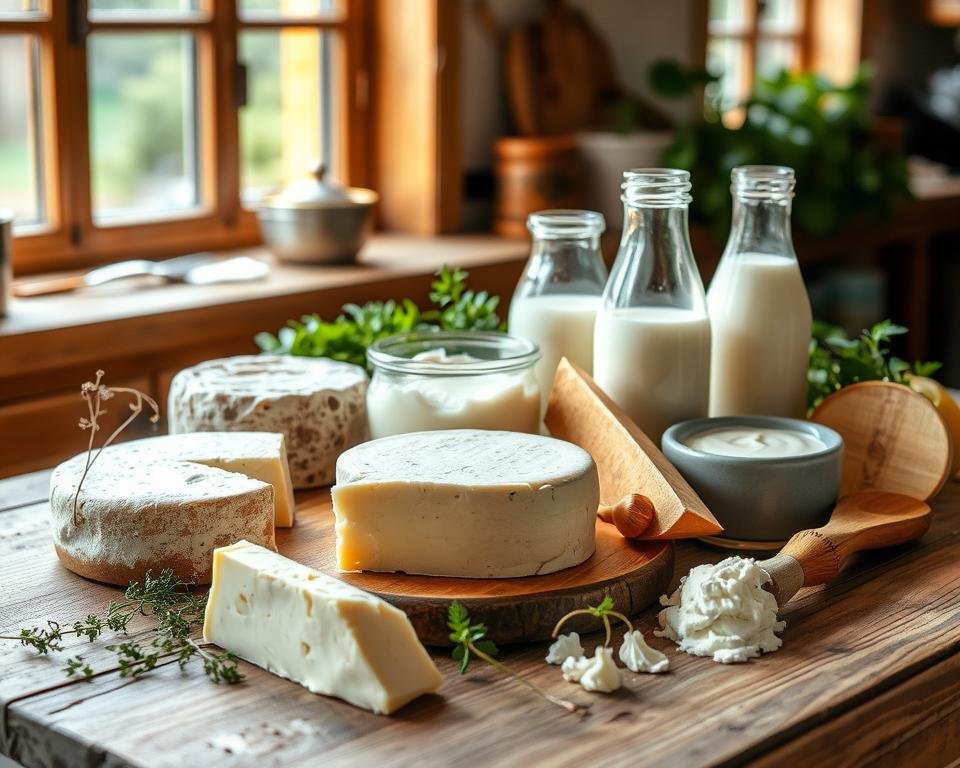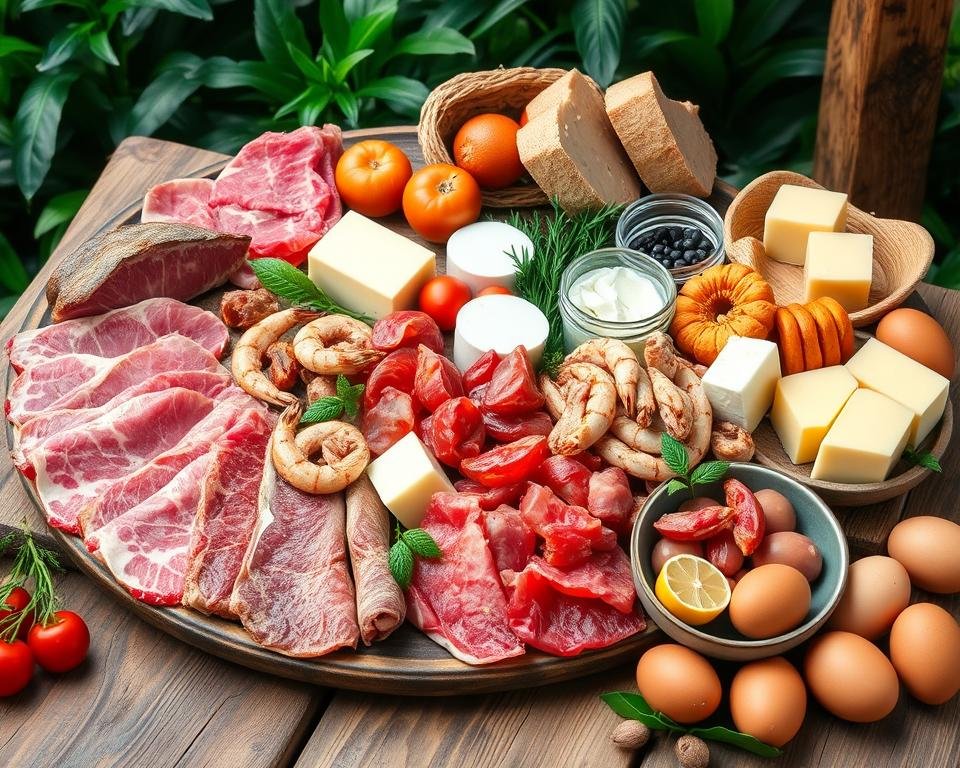Discover the secrets to better health with an animal-based diet. This diet, inspired by our ancestors, includes high-quality meat, organs, fruits, honey, raw dairy, and eggs. It’s a journey to improved health, weight management, mental well-being, and support for healthy pregnancies.
The animal-based diet is based on our evolutionary history. It’s the diet our ancestors followed for nearly two million years. Unlike the standard American diet, it avoids processed foods and reduces chronic inflammation. This leads to many health benefits, including lower heart disease risk, better blood pressure, and improved mental function.
Looking to improve your health or performance? The animal-based diet is a sustainable, evidence-based choice. It focuses on nutrient-dense, whole foods. Learn how a carnivore diet and wellness transformation can change your life.
Use our free Nutrition Guide Calculator to calculate your Calorie need
Understanding the Animal Based Diet vs. Carnivore Diet
The Carnivore Diet and the Animal Based Diet both focus on animal foods. But they differ in their carb intake. The Carnivore Diet is all about meat, eggs, and dairy with no carbs. The Animal Based Diet, on the other hand, includes meat, organs, raw dairy, and some fruits and sweeteners.
What Defines a Carnivore Diet
The Carnivore Diet became popular after Shawn Baker talked about it on The Joe Rogan Experience Podcast in December 2017. It cuts out all plant foods like fruits, veggies, grains, and legumes. It only includes animal products. Fans say it helps avoid toxins like lectins and phytates.
Key Differences in Dietary Approaches
The Animal Based Diet is more flexible than the Carnivore Diet. It lets you have some carbs from fruits and natural sweeteners. This way, you get more vitamins, minerals, and other good stuff that animal-only diets might miss.
Benefits of Animal Based Flexibility
The Animal Based Diet is seen as the best diet for most people. It mixes animal proteins, fats, and some carbs for better health. It helps with feeling full, blood sugar, and overall health. Plus, it’s good for sleep, hormones, and sports performance, making it a great long-term choice.
“The Animal-based diet emphasizes consumption of whole, minimally processed foods and prioritizes nutrient-dense animal proteins, fats, and essential nutrients.”
The Science Behind Animal Based Nutrition
The animal-based diet comes from evolutionary biology. Plants have defense chemicals that can harm humans if eaten too much. These chemicals might cause autoimmunity, neurological issues, digestive problems, and joint pain.
The diet focuses on ruminant animals like cattle and deer. They can remove harmful linoleic acid from their diets. Too much linoleic acid, found in vegetable oils, can damage cells and cause chronic diseases.
Studies show animal proteins are better than plant-based ones. Animal proteins help build muscle faster than plant proteins. Most plant proteins have a lower score than animal proteins like casein and whey.
“It is dangerous for humans to eat all-meat diets,” states Dana Ellis Hunnes, a senior clinical dietitian at UCLA Medical Center, highlighting the health risks of extreme diets.
While the meat-only diet has benefits, balance is key. Eating a variety of nutrient-dense foods, including plants, is important for health and well-being.
- The hashtag #carnivorediet has over 650 million views on TikTok, showing a significant interest in all-meat diets on social media.
- Shawn Baker, a prominent figure promoting the no-carb, all-meat carnivore diet, has more than a quarter of a million Instagram followers, indicating a substantial following for this diet trend.
- Paul Saladino, the creator of the animal-based diet, boasts to help people “live a life of optimal health” on his website, which implies a strong belief in the benefits of an all-meat diet.
- Mikhaila Fuller, the inventor of the lion diet, has a YouTube account with nearly a million subscribers, showing her influence in promoting her meat-based diet.
While a meat-only diet may seem appealing, it’s important to be balanced and informed. Eating a variety of foods, including both animal and plant-based sources, is best for health and well-being.
Essential Components of an Animal Based Diet
An animal-based diet focuses on high-quality meats and nutrient-rich organ meats. Grass-fed animals like beef, lamb, and bison offer great protein and important vitamins and minerals. Organ meats, such as liver and heart, are also recommended for their unique nutrients.
Use our free Nutrition Guide Calculator to calculate your Calorie need
Quality Meat Sources and Selection
Choosing high-quality meat is key in an animal-based diet. Grass-fed and pasture-raised meats are better than conventional ones. They have healthier fats, more antioxidants, and are more nutrient-dense because they eat their natural diet.
Organ Meats and Their Benefits
Adding organ meats to your diet brings many essential nutrients. Liver is packed with vitamin A, B12, iron, and copper. Heart and kidney are great for protein, B12, and minerals like selenium and zinc. Bone marrow, spleen, and pancreas also add unique vitamins and minerals.
Permitted Fruits and Natural Sweeteners
- Organic, seasonal fruits like berries and citrus are okay in small amounts. They provide carbs and natural sugars.
- Raw honey, maple syrup, and dairy products like milk and cheese are also good for natural sweetness and carbs.
- Some people can eat small amounts of organic sweet potatoes and white rice without problems.
The animal-based diet encourages eating whole, nutrient-dense foods. It avoids leaves, stems, roots, and seeds because they can be harmful.
“Eating a variety of high-quality animal-based foods, including organ meats, is key. It provides all the essential nutrients for good health and well-being.”
Raw Dairy and Its Role in Animal Based Eating
For those on an animal-based diet, raw dairy from grass-fed cows is key. It’s full of vitamins, enzymes, and good bacteria. These help with digestion and health.
The diet looks at A1 and A2 casein proteins in milk. A2 is better for those who can’t handle dairy. If you can’t find raw milk, raw cheese or fermented dairy is a good choice.
“Raw dairy products are never heated, retaining raw goodness and nutritional benefits that are destroyed in pasteurization processes.”
Experts say go for full-fat raw dairy for better health. People eating can you eat cheese on carnivore diet dairy are less likely to be overweight.

Raw cheddar cheese, aged 60 days, is made from whole raw milk. It’s packed with vitamins, minerals, and good fats. Raw butter and cream also have heart-healthy fats and vitamins, without harmful additives.
Adding these raw dairy products to your diet can greatly improve your health.
Meat Cheese Diet
The meat cheese diet has gained traction among enthusiasts of low-carb and ketogenic lifestyles, focusing primarily on high-protein and high-fat intake. This approach combines the benefits of a meat-only diet with the richness of various cheeses, creating a culinary experience that is both satisfying and energy-dense. Advocates of this diet often argue that by eliminating carbohydrates, the body can enter a state of ketosis, where it effectively burns fat for fuel instead of glucose. This can lead to accelerated weight loss and improved metabolic health.
A meat cheese diet typically emphasizes high-quality sources of protein, including grass-fed beef, pastured poultry, and wild-caught fish, paired with a variety of cheeses that not only enhance flavor but also provide essential fats and nutrients. Cheese, particularly those that are low in carbohydrates such as cheddar, gouda, and mozzarella, can be a delicious complement to meats. This balance not only keeps meals interesting but also helps to break dietary monotony.
However, it’s worth noting that while the meat cheese diet may yield quick results, it may also come with potential downsides. Critics raise concerns about the lack of fiber, vitamins, and minerals commonly found in fruits and vegetables, which are often excluded from such stringent diets. Additionally, some individuals might experience digestive issues or imbalances due to the high intake of saturated fats and proteins. Therefore, anyone considering a meat-only diet or a meat cheese diet should carefully evaluate their specific health needs and consult with a healthcare professional before making drastic dietary changes.
Ultimately, for those who thrive on high-protein, low-carb eating patterns, the meat cheese diet can offer a fulfilling and effective way to manage weight and enhance health. As with any dietary approach, moderation and balance are key, and it’s essential to listen to one’s body to ensure that the diet supports overall well-being.
Foods to Avoid and Common Pitfalls
The animal-based diet warns against vegetable oils like canola and safflower. These oils have lots of polyunsaturated fatty acids, which can harm your metabolism. Instead, it suggests using tallow, butter, or ghee. Olive oil, avocado oil, and coconut oil are safer but might upset some people.
Vegetable Oils and Their Dangers
Vegetable oils are bad for your health, the diet says. They have too many omega-6 fatty acids. These can cause inflammation and upset your body’s natural balance.
Plant Defense Chemicals
The diet also warns about eating too much of plant foods with defense chemicals. These are found in leaves, stems, roots, and seeds. They can be hard to digest and may cause stomach problems for some.
Processed Food Considerations
Processed foods are a no-go on the carnivore diet. They often have vegetable oils and harmful additives. These can ruin the diet’s benefits and lead to carnivore diet side effects for some.



